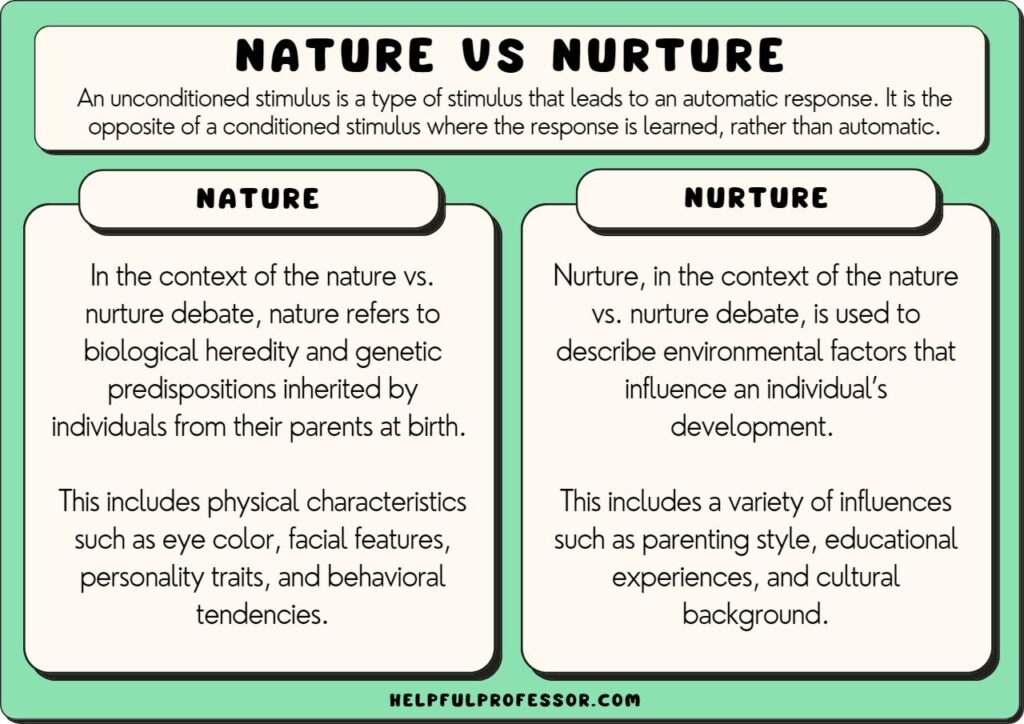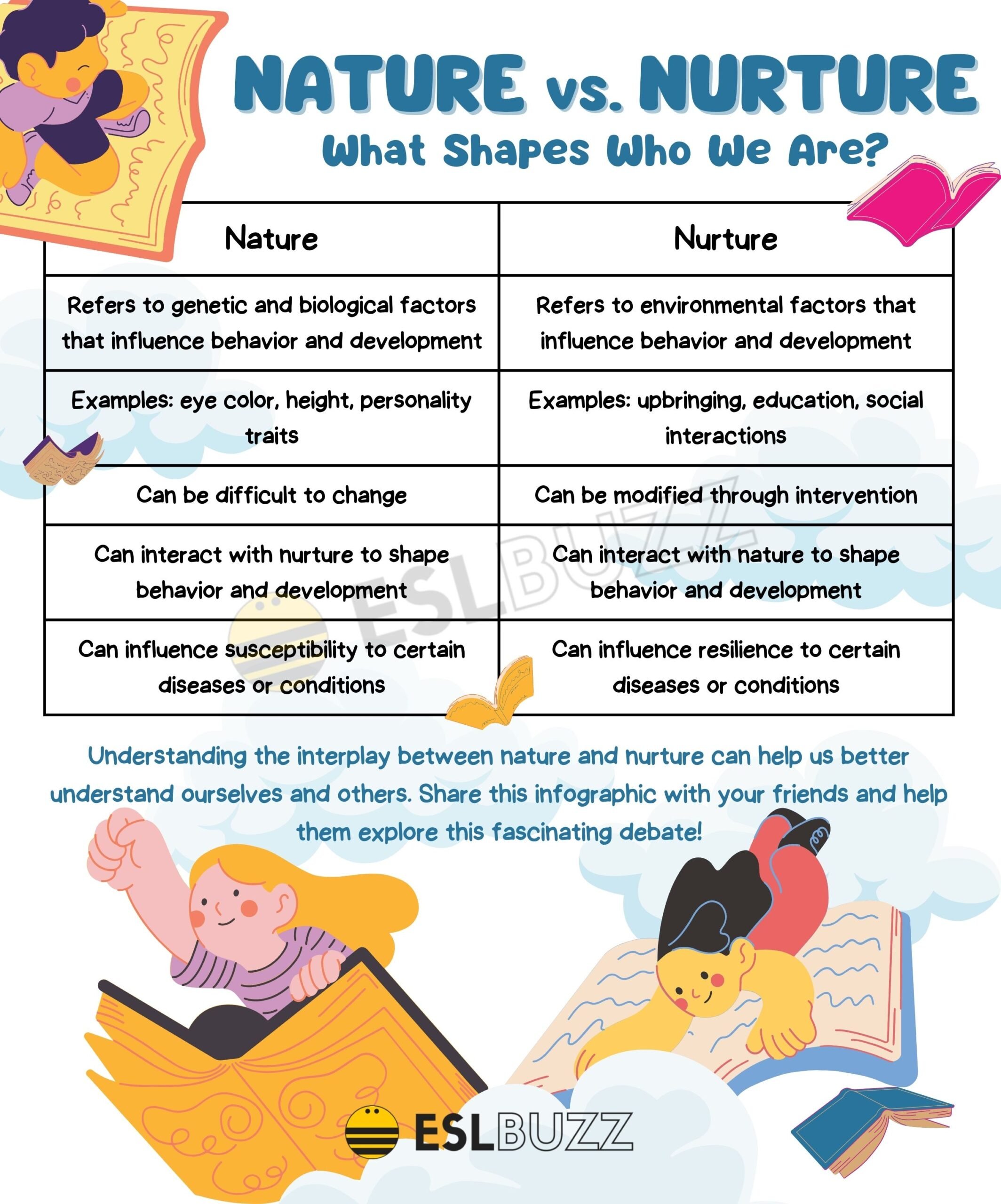Nature vs. Nurture: The Ongoing Debate in Behavior
Introduction
The nature vs. nurture debate has been a longstanding topic of interest in the field of psychology. It revolves around the question of whether human behavior is primarily influenced by genetic factors (nature) or environmental factors (nurture). This ongoing debate has captivated researchers, scholars, and the general public alike, as it has profound implications for understanding human development and individual differences.
The Nature Argument
The proponents of the nature argument believe that genetics play a significant role in shaping human behavior. They argue that certain traits, such as intelligence, personality, and even mental disorders, are largely determined by our genetic makeup. These individuals emphasize the importance of inherited genes and biological factors in explaining behavioral patterns.
Genetic Predispositions
One key aspect of the nature argument is the concept of genetic predispositions. These are innate tendencies or inclinations that individuals are born with. For example, some people may have a genetic predisposition towards being more extroverted or introverted. These predispositions can influence how individuals respond to their environment and shape their behavior accordingly.
Twin Studies
Twin studies have been instrumental in supporting the nature argument. By comparing the behavior of identical twins, who share 100% of their genes, with that of fraternal twins, who share only 50% of their genes, researchers can assess the relative contributions of genetics and environment. Studies have consistently shown that identical twins raised separately exhibit striking similarities in behavior, suggesting a strong genetic influence.
The Nurture Argument
On the other side of the debate, proponents of the nurture argument argue that environmental factors are the primary drivers of human behavior. They contend that individuals are shaped by their experiences, upbringing, and social interactions. According to this perspective, genes may provide a foundation, but it is the environment that ultimately determines how these genes are expressed.
Environmental Influences
Environmental influences encompass a wide range of factors, including family, culture, education, and socioeconomic status. These factors can shape an individual’s beliefs, values, and behaviors.
Summary
The nature vs. nurture debate revolves around the question of whether our behavior is primarily determined by genetic factors or shaped by our environment and experiences. Proponents of the nature argument argue that our genetic makeup plays a significant role in determining our behavior, personality traits, and even intelligence. They believe that certain characteristics are inherited and passed down through generations, making them an inherent part of our nature.

On the other hand, advocates of the nurture argument emphasize the impact of environmental factors on our behavior. They argue that our upbringing, social interactions, and experiences shape our personality and behavior more significantly than our genetic predispositions. They believe that individuals are born as blank slates and are molded by their surroundings.
While the debate between nature and nurture has been ongoing for decades, it is now widely accepted that both factors play a crucial role in shaping human behavior. Researchers have found that genetic predispositions interact with environmental influences to determine various aspects of our lives, including intelligence, mental health, and even susceptibility to certain diseases.
Understanding the interplay between nature and nurture is essential for comprehending human behavior and development fully. It helps us appreciate the complexity of our individual differences and challenges simplistic notions of determinism. By acknowledging the significance of both nature and nurture, we can gain a more holistic understanding of what makes us who we are.
- Q: What is the nature vs. nurture debate?
- A: The nature vs. nurture debate is a longstanding discussion in psychology and sociology about whether human behavior is primarily influenced by genetics (nature) or environmental factors (nurture).
- Q: What is the nature perspective?
- A: The nature perspective argues that genetics and biological factors play a significant role in shaping behavior. It suggests that certain traits and characteristics are inherited and predetermined.
- Q: What is the nurture perspective?
- A: The nurture perspective emphasizes the impact of environmental factors, such as upbringing, socialization, and experiences, on human behavior. It suggests that individuals are shaped by their surroundings.
- Q: Is it nature or nurture that determines behavior?
- A: The debate does not seek to determine which factor is solely responsible for behavior, but rather to understand the complex interaction between genetics and the environment in shaping human behavior.
- Q: Can nature and nurture be separated?
- A: It is difficult to separate the influence of nature and nurture as they are intertwined. Both factors interact and work together to shape an individual’s behavior and development.
- Q: Are certain behaviors purely genetic or environmental?
- A: Most behaviors are a result of a combination of genetic and environmental factors. While some behaviors may have a stronger genetic basis, environmental factors can still play a significant role.
- Q: Can the effects of nature and nurture be measured?
- A: Measuring the exact contributions of nature and nurture to behavior is challenging. Researchers use various methods, including twin studies and adoption studies, to estimate the relative influence of genetics and environment.
- Q: Is there a consensus in the nature vs. nurture debate?
- A: There is no definitive consensus as the debate continues. Many researchers now recognize that both nature and nurture interact to shape behavior, and the focus has shifted towards understanding their complex interplay.

Welcome to my website! I’m Harrison Probert, a passionate and experienced Digital Marketing Manager specializing in Behavioral Psychology, Conversion Rate Optimization (CRO), User Behavior, Persona Development, and Site Usability. With a deep understanding of human behavior and a keen eye for data-driven strategies, I strive to create impactful digital experiences that drive results.

